
The Business of Fashion
Agenda-setting intelligence, analysis and advice for the global fashion community.

Agenda-setting intelligence, analysis and advice for the global fashion community.
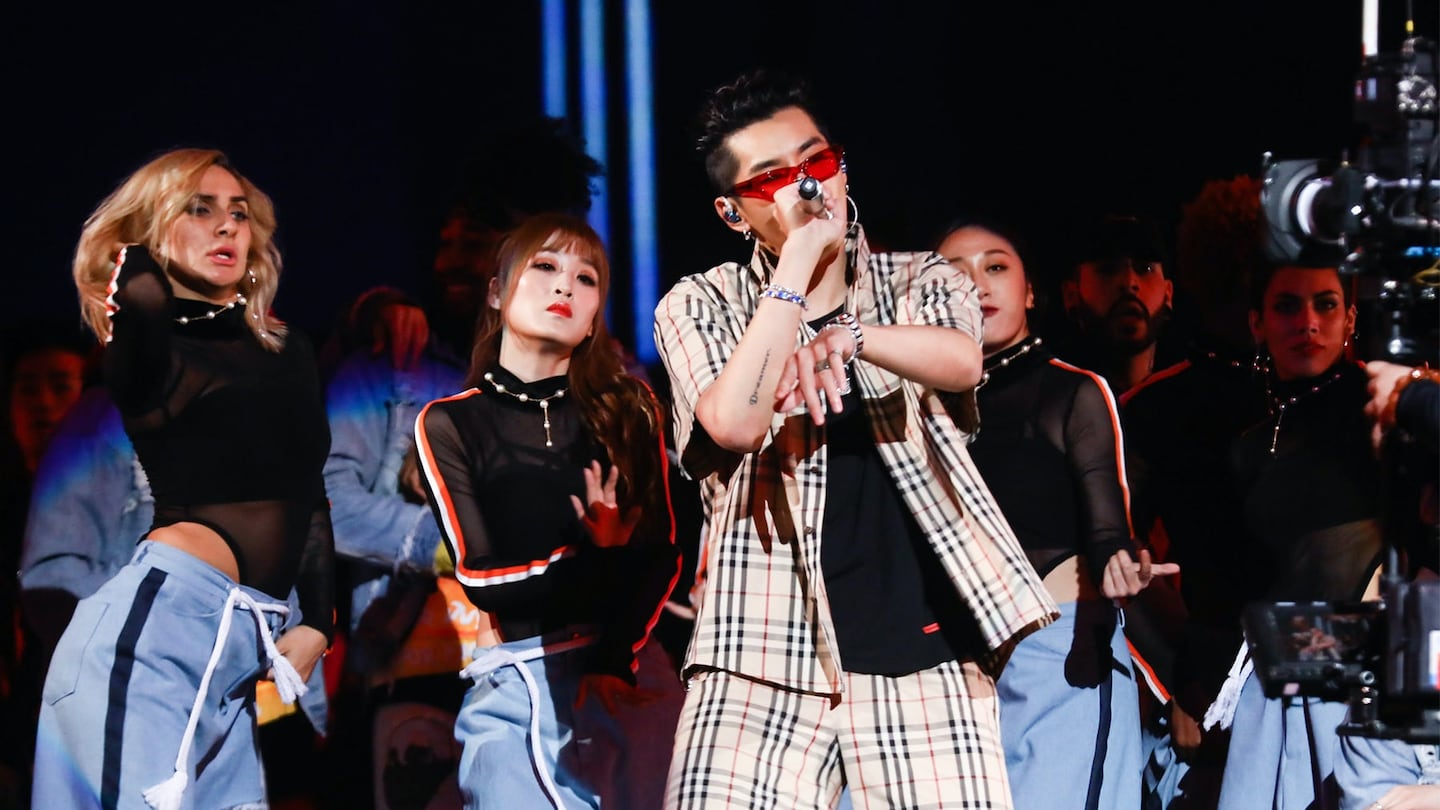
SHANGHAI, China — If a product from your brand suddenly became synonymous with "guy chopping" on the Chinese Internet – would that be a good thing? It might not sound like the most pleasant term, but zhannan, or "guy chop" is actually high praise for products like lipstick. The idea being that a zhannan lipstick is so attractive that it can fell a man in his tracks.
Ask young Chinese women about the best “guy chop” lipsticks they own and many will reply: “YSL 12” — meaning YSL's Vernis à Lèvres Glossy Lip Stain in colour 12 "Corail Fauve" — a product forever intertwined with the online Chinese slang term that drove its immense and enduring popularity.
China’s youth, who have been raised from the cradle within the country’s unique digital ecosystem, live much of their life online where the environment is not only difficult for foreign companies to navigate but sometimes hard to interpret unless they have a native understanding of the trending keywords making waves at any given time.
“Brands should stay on top of Chinese internet slang not only to gain insights into consumer trends and product preferences, but to incorporate it into their content marketing and SEO strategies,” Chinese social media marketing expert and head of marketing at Chatly, Lauren Hallanan said.
ADVERTISEMENT
According to Hallanan, this is particularly important on platforms with an e-commerce component as consumers regularly use apps like Xiaohongshu and Taobao as search engines in order to research products and trends as part of their purchasing journey. This means a brand could be missing out on traffic and sales if they ignore the latest terminology consumers are using.
China’s youth demographic is one of the most active online constituencies on earth, averaging 4.7 hours on their handsets a day “just for entertainment purposes," up from 4.1 hours a year ago, according to data from research firm QuestMobile.
The cycle of online slang and accompanying memes in China falling in and out of favour is dizzying, making it challenging to separate those with real consumer relevance from those that are not. But there are ways to find out.
“Social listening can help decipher what's a flash-in-the-pan and what's really resonating,” said Michael Norris, research and strategy manager for AgencyChina. He says his agency maps linguistic and visual phenomena to trend frameworks for each category.
Social listening can help decipher what's a flash-in-the-pan and what's really resonating.
“When it's done well, social listening shows what expectations are changed, what new trajectories are opened up for the category, and what does it mean for existing and potential category players,” he explained.
This is particularly important this time of year, in the lead up to the mega-sales bonanza known here as Double 11 and often called “Singles’ Day” in the West. In the weeks before the festival’s official date of November 11, hundreds of millions around the country are active online, researching the products and deals available on various platforms and formulating their Double 11 shopping strategy.
For the luxury industry, research from influencer marketing agency ParkLu shows that 82 percent of China’s luxury consumers consider themselves “heavy social media users” with WeChat, Weibo, Xiaohongshu (RED), and Douyin their most used platforms.
This high level of social media usage occurs among China’s luxury consumers because they skew younger than their international peers. According to McKinsey, a third of global luxury spend in 2018 came from Chinese consumers, with more than half of that contributed by the post-80s generation, which roughly coincides with Millennials in a Western context. Hot on their heels are the post-90s, contemporaries of Gen-Z.
ADVERTISEMENT
A case in point is the xiaoxianrou, or the "little fresh meat" phenomenon, which started life as online slang for the influx of fresh-faced androgynous boy band members and soap opera stars who have exploded in popularity among post-90s Chinese women in particular. Though they might not overtly use the slang term, luxury brands have aggressively leaned into the trend it represents, with idols such as Lu Han, Jackson Yee and xiaoxianrou Kris Wu as the face of international luxury brands including Louis Vuitton, Bottega Veneta, Bulgari and Cartier.
With a population of 855 million, two and a half times the entire population of the United States, China’s netizens have become a force to be reckoned with. As a number of international brands have discovered over the past 12 months, paying close attention to this vast online community is vital to success, or even survival, in a dramatically evolving China market.
While the fashion industry has understandably focused on the negative consequences of recent online controversies when Chinese netizens felt offended, they can do much more in terms of learning how to use the online environment to their advantage. Garnering insight from youth culture that infiltrates the consumer mindset through trending language is just one of many ways to do so.
The following slang topics are all indicative of trends — fashion, beauty and cultural — impacting China’s online marketplace in 2019.
What it means: Literally translates as "clock in," as one would at the start of a work shift. In practice the term is used to mean a "must do" activity.
Why it's important: These daka moments are the things people want to post themselves doing on social media, in order to show off to friends — a selfie in front of a Paris landmark after shopping on rue Saint-Honoré, for example. Today, daka has become instrumental to offline brand events in China, what might be called in the West "Instagrammable" moments. In China, however, more often than not they appear on WeChat Moments, a Facebook-style newsfeed function of the super app.
What it means: Though it translates as "national wave," guochao actually means the national trend and refers to the rise of nationalism, particularly relating to Chinese brands and Chinese-infused style.
Why it's important: Though it started life as an online buzzword, guochao has now entered the mainstream, even being used by official state media in stories covering the rise of Chinese brands. The popularity of Chinese brands in recent years has been a reversal from a previous hyper-devotion to Western brands, accompanied by the belief that international brands were a guarantee of quality. A search on Taobao for guochao reveals hundreds of local fashion brands, many of them independent. But there are also Chinese giants like Anta, Li Ning and Peacebird that have become more competitive against foreign rivals in their respective categories. According to Michael Norris, guochao is a "critical term" for brands to understand. "It neatly captures a newfound sense of confidence in Chinese brands," he said. "This confidence cuts two ways – Chinese brands have more confidence in their ability to design, innovate and go to market, and consumers have more confidence in local brands' ability to meet their expectations."
ADVERTISEMENT
What it means: "Hot search" is usually related to microblogging site Weibo and is used in much the same way as "trending topics" are in the West.
Why it's important: The resou on any given day on Weibo is often used as a pulse of what people are talking about on the platform, which currently boasts 500 million registered users. It has been fairly common practice for celebrities and companies to pay agencies to inflate mentions and appear as though they are a hot topic on the platform, a practice that Weibo has periodically tried to crack down on, without being terribly successful. Earlier this year, four people were arrested for using bot accounts to like and share Weibo posts by Cai Xukun, the 21-year-old singer whose name is routinely highly ranked on Weibo's "hot searches".
What it means: Zhongcao literally means to plant grass and it's used today in the same way people might use "to plant a seed" in English, the way an idea or suggestion is "planted" in someone's mind.
Why it's important: A celebrity or influencer who has a lot of success in converting their fans and followers into paying consumers for brands is commonly called a 'zhongcao machine' on the Chinese Internet. Consumers see their idol wearing or using something and the seed is planted in their mind, they too must have it. The biggest zhongcao machines, people like Becky Li and Tao Liang, otherwise known as Mr Bags, are able to sway fashion purchases for a sizable proportion of the their captive audiences.
What it means: The word hen means "very" and A in this context refers to a Type A personality, as in, a more ambitious, outgoing and aggressive person.
Why it's important: On Chinese social media and e-commerce sites, henA is most often used to refer to women, in particular urban professional women who wear suits and downplay overt expressions of femininity. Though the term has had a negative connotation in the past, criticising women who are too masculine, it has been reclaimed recently, particularly as popular Chinese television programmes increasingly show assertive, independent women in lead roles. In 2019, the series "All is Well," featuring actress Yao Chen, became something of a sensation, especially her wardrobe of henA office attire from brands like Burberry and Max Mara.
What it means: Literally translating as "frozen age", dongling is commonly used to describe celebrities who look good for their age and the beauty regiments that can help ordinary consumers do the same.
Why it's important: Anti-ageing is taken seriously by women all over the world, but special attention is paid by a younger age bracket in China, with anti-ageing products incorporated into skincare routines often from their early 20s. Highly-ranked brands on Taobao from a search of dongling products include Clarins, SK-II and La Mer, with products containing collagen performing especially well.
Additional Reporting by Aijing Wang and Denni Hu.
时尚与美容
FASHION & BEAUTY
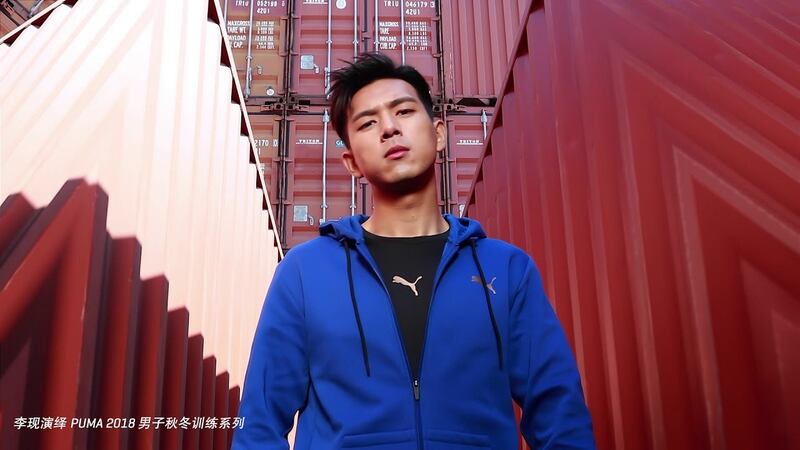
Li Xian in a campaign for Puma | Source: Courtesy
New Trending Chinese Heartthrobs
Looking at celebrity rankings since July, a few regulars have dominated the top of the list, namely actors Xiao Zhan, Li Xian, and Wang Yibo, all of whom starred in hit summer TV shows. Noticing their newly-found popularity, brands have moved in quickly to tap into their commercial value. Li Xian alone took on four new brand ambassadorships and has appeared on eleven fashion magazines, while Xiao Zhan and Wang Yibo saw similar accolades and commercial opportunities. (Jing Daily)
Pre-Singles Day Buzz for Estée Lauder
Among those clambering for the new group of heartthrobs, on beauty brand snapping up two top names at once: Estée Lauder. The brand appointed Li Xian to represent its skincare and beauty line in the APAC region in September and announced Xiao Zhan would become the face of its fragrance and beauty line just a few days ago. This has quickly brought a rush of commercial success ahead of Singles Day, as Estée Lauder opened up pre-orders for fans of the celebrities and the brand. According to Tmall, the company achieved $70 million (500 million yuan) in the first 25 minutes of the pre-sale, quickly beat sales records from last year's Singles Day. (Jing Daily)
Chinese Fashion & Beauty Brands Report 3rd Quarter Earnings
Demonstrating the resilience of China's consumer market in the face of economic headwinds, recent earnings reports for domestic fashion and beauty players show growth of various speeds. Senma apparel's first three quarters of revenue rose nearly 36 percent year-on-year, with net profit rising 2.79 percent; fast fashion player Ellassay saw a 2.62 percent net profit increase on the year and Anzheng Fahion Group, which operates several of its own brands but is also an agent for Stella McCartney in China, saw its net profit rise 12.55 percent. In the beauty space, Shanghai Jahwa saw net profit increase 19.09 percent year-on-year to 540 million yuan, driven largely by star brand Herborist. (Various)
科技与创新
TECH & INNOVATION
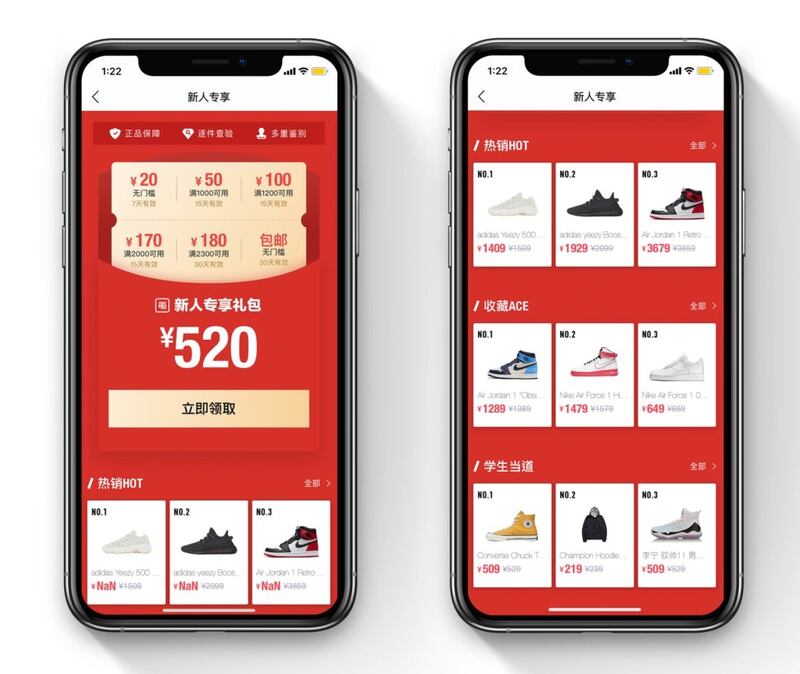
Screenshots from Chinese sneaker sales unicorn Poizon | Collage by BoF
China’s Crypto Speculators are Causing a Sneaker Bubble
Local sneaker marketplaces like Nice, DoNew and Poizon, which reached unicorn status with a valuation surpassing $1 billion, have emerged in parallel with global e-commerce platform StockX. The Chinese platforms have inspired a new type of speculative sneaker trader similar to those who appeared during the cryptocurrency boom a few years ago. Analysts now say that the increased hype has led to wild volatility in the sneaker market and that trading prices are increasingly disconnected from real-world value. (Abacus)
Calls for Calm as Xi’s Endorsement Sends Blockchain Stocks Soaring
Chinese state media urged investors to remain rational and not take Beijing's support for blockchain as a boost for virtual currencies, after comments by Chinese President Xi Jinping drove up shares in blockchain-related firms and the price of bitcoin. Xi said last week that China should accelerate the development of blockchain technology, a digital ledger that forms the backbone of many cryptocurrencies such as bitcoin. His remarks sparked a rush into the shares of firms engaged in, or believed to be engaged in blockchain or digital currency-related businesses. Beijing has not traditionally been a supporter of blockchain – in 2017 creating and selling virtual currencies was banned, causing the shuttering of local cryptocurrency trading exchanges. (Reuters)
Online Payment Services and Live Streamers Liable for Data Breaches
China's Supreme Court has just expanded the scope of "web service providers" that can be held criminally liable for data leaks to include online payment services, games, live streaming platforms, and even individual internet users. The message that the nation's highest court seems to be showing is that leaking data is serious business for gaming operators and even individual web users, with the possibility of offenders landing in jail. (Caixin)
消费与零售
CONSUMER & RETAIL
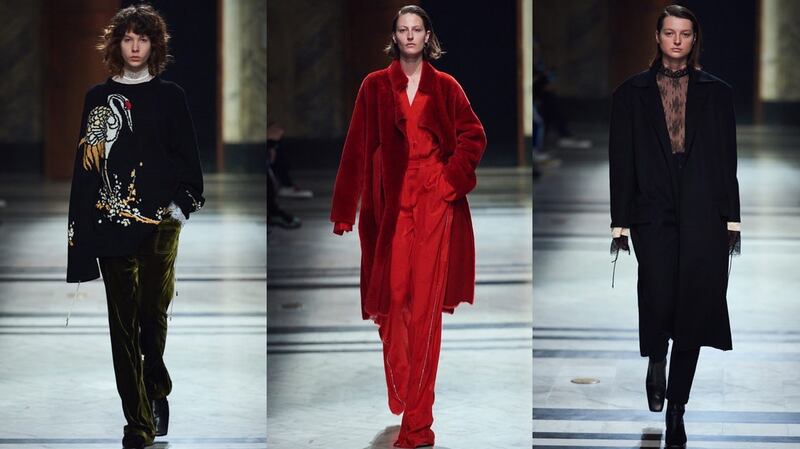
Looks from Mo&Co's recent 15th Anniversary Show in Shanghai | Source: Courtesy
Mo&Co. Parent Company Exits Hong Kong Market
The Chinese apparel group EPO has decided to temporarily withdraw from the Hong Kong market, saying the social and economic situation in Hong Kong has seriously affected the long-term development of the apparel retail industry. The decision comes as mainland businesses in Hong Kong increasingly become the target of protesters anger. EPO group closed 14 stores in Hong Kong from brand including Mo&Co., Little MO&Co., and Edition. And they may not be the only ones to go, with many brands waiting until the end of the year to renegotiate retail spaces and evaluate their relative positions. (Fashion Business Daily)
Galeries Lafayette Wants to Earn €1 Billion from Chinese Stores by 2025
The iconic French department store chain has announced plans to expand its operations in China with 10 new high-end stores by 2025. Chinese nationals are already major customers at Galeries Lafayette's 59 French stores, particularly the flagship in the capital. The retailer estimates that by 2025, its combined Chinese outlets will earn €1 billion ($1.1 billion) in revenue. Galeries Lafayette CEO Nicolas Houzé to The Financial Times: "It will be hard for us to expand a lot more in France. China is a great opportunity for us."(Financial Times)
China’s Five Year Plan to Build “International Consumer Centre Cities”
The Ministry of Commerce recently proposed the build of "a number of international consumer centre cities with global influence" around China within the next five years. According to the proposal, these international consumer centre cities will promote the formation of a strong domestic market and enhance consumption, making the significant to the fundamental role of economic development in China. Beijing, Shanghai, Chongqing and Hainan have all indicated they are keen to participate in the new initiative. (Winshang)
政治,经济与社会
POLITICS, ECONOMY, SOCIETY
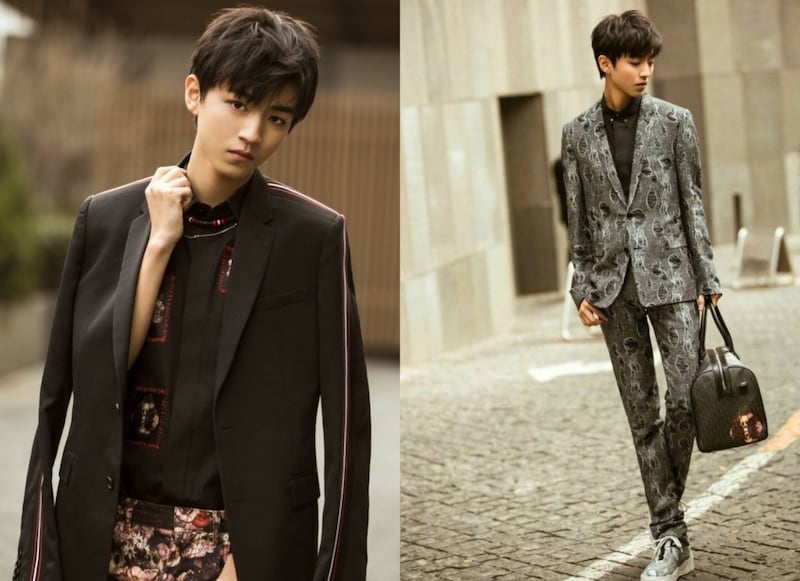
Wang Junkai is one of a new generation of xiaoxianrou celebrities, here pictured in a campaign image for Dior | Source: Courtesy
Official Report Blames CIA for Rise of “Feminine” Male Celebrities in China
The popularity of xiaoxianrou "little fresh meat" – China's young, fresh-faced, androgynous class of celebrities – is due to a CIA operation, according to a report from the Chinese Academy of Social Sciences, the country's premier research institution for social sciences. The report, called "Do you know how hard the CIA is working?" condemns the rise of "feminine male artists" and pinpoints their origins to Johnny & Associates, a talent agency started by American-born Japanese businessman Johnny Kitagawa. It claims that Kitagawa colluded with the CIA to "weaken the male temperament of Japanese society," which led to the feminization of male celebrities across Asia, spreading to China. (Radii)
Elon Musk Set Up His Shanghai Gigafactory in Record Time
In just 168 working days, Tesla has gone from permit approval to a finished plant in Shanghai, with the first Chinese-made Tesla Model 3 destined for market on track to roll off the assembly line this year. "This is quite fast, even by Chinese standards," said Ivan Su, an analyst at Morningstar Inc. Musk has predicted that his company will be producing at least one thousand cars a week in Shanghai by the end of the year, a volume the company's original factory in California spent months trying to hit. Currently, Tesla said it is already producing "full vehicles on a trial basis." (Bloomberg)
China Advances in World Bank’s Ease of Business Rankings
According to a new report from the World Bank, China jumped to 31st from 45th in its "Doing Business" ranking, with Beijing showing an "eagerness to reform" in the face of its trade war with the US and slowing GDP growth. In recent years China has come under increasing criticism from the US and other Western trading partners for perceived barriers to operating in the country, including complaints about restrictions on market access, an uneven playing field for foreign firms, and lack of adequate protection for intellectual property, among others. The World Bank report suggests that China is heeding the message and starting to address foreign concerns. (South China Morning Post)
China Decoded wants to hear from you. Send tips, suggestions, complaints and compliments to our Shanghai-based Asia Correspondent casey.hall@businessoffashion.com.
With consumers tightening their belts in China, the battle between global fast fashion brands and local high street giants has intensified.
Investors are bracing for a steep slowdown in luxury sales when luxury companies report their first quarter results, reflecting lacklustre Chinese demand.
The French beauty giant’s two latest deals are part of a wider M&A push by global players to capture a larger slice of the China market, targeting buzzy high-end brands that offer products with distinctive Chinese elements.
Post-Covid spend by US tourists in Europe has surged past 2019 levels. Chinese travellers, by contrast, have largely favoured domestic and regional destinations like Hong Kong, Singapore and Japan.